North Carolina War Between the States Sesquicentennial
African Slavery and the War
“The Constitution of the Confederacy did not establish slavery. It left the matter to the States, just as did
the Constitution of the United States, and it contained a stronger prohibition against the African slave
trade than did the old Constitution.” Dr. Clyde N. Wilson
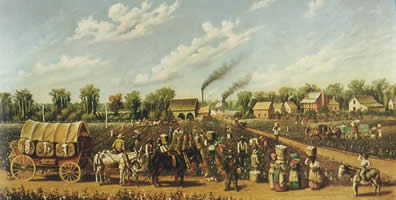
Was the 1861 War Waged on the Issue of Slavery?
"If, in 1776, the British had won, the slaves of Washington, Mason, Henry
and Jefferson would have been set free by virtue of Lord Dunmore’s proclamation of emancipation. But the
Revolutionary struggle was not begun or waged on the issue of slavery, not to anybody’s present
understanding. [Royal Virginia] Governor Dunmore was not concerned, primarily, with the freedom of the negroes;
he hoped that the promised freedom would handicap the rebellion against British authority.
President Lincoln freely admitted that his proclamation was “a war measure”; and he had been in favor of
perpetuating, by Constitutional amendment, if need be, the “bonds of slavery” wherever it existed within the bounds
of the United States. Such was the form of the Thirteenth Amendment as passed by a Northern Congress in 1861.
Why not believe Lincoln when he specifically said he was not waging the war to free the slave? Why not believe
the testimony (now wholly lost sight of in the pathetic fallacy of the “moral” issue) of contemporary witnesses
that the Northern armies would have melted away had any such idea been understood in 1861?”
General Grant held slaves. Lee was an emancipationist. A.W. Bradford was the Union Governor of Maryland
in 1862-1864. He was a large slaveholder, while his neighbor, Bradley T. Johnson, a distinguished
Confederate general, owned no slaves. Lincoln’s proclamation did not affect slavery in Maryland
because slavery in Maryland was protected under the Union.”
(John Wilkes Booth [Francis Wilson, Houghton-Mifflin], Reviewed by Matthew Page Andrews,
Confederate Veteran, April 1929, page 129)
A War Caused by Slavery?
The withdrawal of the Southern States from the Union was driven by the constant slavery agitation of Northern
abolitionists, who incited bloody slave insurrection, sent antislavery literature southward through the mails,
and who helped bring to power the Republican party whose platform urged the containment of African slavery
within the boundaries of the existing slave-holding States, and the territories and new States were to be open
only to free, white labor and not the black race.
It is properly observed that slavery agitation described above caused secession, and secession caused the
North to invade the South to force those States back into a territorial Union with them. And very importantly,
North Carolina did not secede on May 20, 1861 to protect slavery -- she seceded after a United States
President demanded troops with which to invade a State, a power no Presdient is cloaked with.
Captain S.A. Ashe of North Carolina describes below the populating of America with slaves by the
British and New Englanders – the American South did not construct slave ships nor ply the African coast
in search of human cargo.
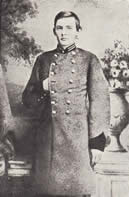
Captain S.A. Ashe
Slave Trade of England and New England:
“In the library of the State College of Raleigh, N.C., there is a notable book of some three hundred
and fifty pages and forty-nine illustrations – the fifteenth publication of the Marine Research Society,
of Salem, Mass., and published in Vermont – the title being: “Slave Ships and Slaving.”
The introduction was written by a British Navy officer, and the text is by George F. Dow. Within ten years
after the discovery of America the Spaniards began the transport of Africans to work in their possessions,
and all the maritime nations of Europe followed their example; and during the next two hundred and fifty
years the English transported as many as all the countries put together.
They began in Queen Elizabeth’s time, kept is up in the next reign, and, in 1662, the Duke of York undertook to
transport to the British Colonies three thousand slaves every year. Ten years later the King himself became
interested and, under contract, England got from Spain the exclusive right to supply the Spanish colonies;
and the King of England and the King of Spain each received one fourth of the profits.
Between 1680-1688 England had two hundred and forty-nine slave ships; from 1713, for twenty years,
15,000 slaves were annually brought to America. In 1786, England brought over 97,000 slaves. During eleven
years, 1783-93, Liverpool owned eight hundred and seventy-eight vessels in this trade, and imported many
thousands of slavers in the West Indies. They were worth some 15,000,000 pounds of that period;
equal to about $150,000,000 now.
While Liverpool was the chief port for this trade, Bristol was a close second. Then, over here,
New England was not slow. Massachusetts started in 1638. However, Rhode Island became the rival
of Liverpool. Ten pages of this volume are devoted to the operations of Rhode Island. There nearly every one
was interested…[and by] 1750, “Rum was the chief manufacture of New England.” About 15,000 hogsheads
of molasses were annually converted into rum in Massachusetts alone. The number of stills in operation was
almost beyond belief [and] in Newport there were no less than twenty-two.”
With rum they purchased Negroes in Africa; these were exchanged for molasses in the Caribbean Islands
and South American, and the molasses was brought to the New England stills; and so the profitable
business was carried on in a circle to the extent beyond ordinary imagination!
It was the very basis of New England’s prosperity. At Newport, Bristol and Providence, some of the most
respectable and wealthy merchants were engaged in the trade. Even preachers and philanthropists were
advocates. “One elder, whose ventures in slaving had usually turned out well, always returned thanks on
the Sunday following the arrival of a slaver that the Africans could enjoy the blessing of a Gospel dispensation.”
The Southern colonies had no ships, nor any molasses. They were not in the trade. However, the British Slaving
Company, in which the King of England was partner and in duty bound to supply the needs of the colonies
as particularly required by Good Queen Anne. The Colonies were forbidden to manufacture, and their
products were required to be shipped to England, where they were exchanged for British goods.
So the more slaves making products, the more goods the Colonies bought in England.
At length Virginia forbade any more importation [of slaves] but the King annulled that Virginia law.
In Jefferson’s draught of the Declaration of Independence he denounced the King most severely for
annulling these prohibitions. However, in 1774, importations [of slaves] were forbidden by the people
of North and South Carolina, and there were no importations until 1803, when South Carolina
opened her ports for four years.
Great Britain abolished the [slave] trade in 1807, just as the Congress of the United States did.
After a few years, other countries followed our example: Spain in 1820, Portugal in 1830; but the
trade between Portuguese Africa and Brazil did not cease until Brazil, in 1888, put a stop to it.
The Southern Colonies had no ships engaged in this trade, nor any molasses or rum, but, as the matter
worked out, those States were the greatest sufferers in the end. Since 1800, the labor of Africans in the
South have largely supplied the world with cotton.
That this volume was prepared by the Marine Research Society of Salem, Mass., speaks well for
New England, and it should be in every library in the South.”
(The Slave Trade, Captain S.A. Ashe, Confederate Veteran, December, 1930, page 457)

How Did African Slaves Arrive in the Americas?
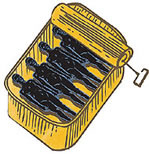
England’s Slave Trade Guilt:
(Speech in the House of Commons by William Wilberforce, 12 May, 1789)
“When we consider the vastness of the continent of Africa; when we reflect how all other countries have
some centuries past been advancing in happiness and civilization; when we think how in this same
period all improvement in Africa has been defeated in her intercourse with Britain;
[W]hen we reflect that it is we ourselves that have degraded them to that wretched brutishness and
barbarity which we now plead as the justification of our guilt; how the slave trade has enslaved
their minds, blackened their character…..What a mortification must we feel at having so long neglected to
think of our guilt, or attempt any reparation!
It seems, indeed, as if we had determined to forbear from all interference [with slavery] until the measure
of our folly and wickedness was so full and complete; until the impolicy which eventually belongs to vice was
become so plain and glaring that not an individual in the country should refuse to join in the abolition; it seems
as if we had waited until the persons most interested should be tired out with the folly and nefariousness
of the trade, and should unite in petitioning against it.
Let us then make such amends as we can for the mischiefs we have done to the unhappy continent;
let us recollect what Europe itself was no longer ago than three or four centuries.
What if I should be able to show this House [of Commons] that in a civilized part of Europe, in the time of
Henry VII, there were people who actually sold their own children? What if I should tell them that England
itself was that country? What if I should point out to them that the very place where this inhuman traffic was
carried on was the city of Bristol?
Ireland at that time used to drive a considerable trade in slaves with these neighboring barbarians; but
the great plague having infested the country, the Irish were struck with a panic, suspected (I am sure very
properly) that the plague was a punishment sent from heaven for the sin of the slave trade, and therefore abolished it.
All I ask, therefore, of the people of Bristol is, that they would become as civilized now as Irishmen were
four hundred years ago. Let us put an end at once to this inhuman traffic – let us stop this effusion of human blood.”
(The World’s Famous Orations, William Jennings Bryan, editor, Funk and Wagnalls, 1906, pp. 66-68)
Britain Populates its American Colony:
“A principal source of labor for the [American] plantations during the seventeenth century were the white
indentured servants brought from England. In the mother country the farm hands and laboring classes
received miserably low wages….[and] found it almost impossible to save [6 pounds], the average cost of
passage to America. The only method by which they could transfer their labor from a cheap market in
England to a dear market in America was the indenture system, really a credit, or installment system
to pay the passage money of crossing the Atlantic. The servant signed a contract by which he sold
his labor to a master for a period usually of four or five years.
Immigration into the colonies was vastly stimulated by the profitable business of securing servants
for the American market. John Harrower, an indentured servant in Virginia, described in his diary which
he kept from 1773-1776, a class of merchants called Soul Drivers, who met immigrant and convict ships
at the docks to buy servants, whom they would drive through the colonies “like a parcel of Sheep” to
sell to the highest bidder. Such servants were sold for prices ranging from [20 pounds] for the highest
type, Scottish soldiers captured after the Jacobite revolt, to [4 pounds] for Irish vagrants.
Most of the indentured servants were young men and women under twenty-five years of age. Under some
masters the indentured servitude approximated the conditions of slavery. The master had the right to
punish his white servant by whipping, and the servant could not leave the plantation without permission.
If a servant married without consent or if a maidservant had an illegitimate baby, the term of service was
extended for one year. If a servant ran away and was arrested, he or she was punished by extending the
term of service two days extra in Virginia and ten days in Maryland for every day of absence.
The labor shortage in America was so great that it led to the dark crime of kidnapping. There were
professional agents in England known a “spirits” who kidnapped “drunks” in taverns and young persons
on the streets to ship them to America for sale as servants. The British government used the Southern
colonies as well as the islands of Jamaica and Barbados as a dumping ground for convicts.
(A History of the Old South, The Emergence of a Reluctant Nation, Clement Eaton,
MacMillan Publishing, 1975, pp. 23-31)
British Trade of Inhumanity:
“On the 1st of April, 1772 the [Virginia] House of Burgesses addressed a hot petition to the crown,
“imploring his Majesty’s paternal assistance in averting a calamity of a most alarming nature.”
It proceeds:
“The importation of slaves into the colonies from the coast of Africa hath long been
considered as a trade of inhumanity, and under its present encouragement we have too much
reason to fear will endanger the very existence of your Majesty’s American dominions.
We are sensible that some of your Majesty’s subjects may reap emoluments from this sort of traffic…
we most humbly beseech your Majesty to remove all those restraints on your Majesty’s governors of
the colony which inhibit their assenting to such House of Burgesses] laws as
might check so very pernicious a traffic."
Such is the actual record of the much-vilified South relating to the African slave trade, taken from official records.
The gradual system of emancipation adopted at the North had undoubtedly led to many of the slaves being
shipped off to the South and sold. When, therefore, after this “abolition,” the movement, from being confined
to the comparatively small band of liberators who were actuated by pure principle, extended to those who
had been their persecutors, it aroused suspicion at the South which blinded it to a just judgment of the case.
The statutory laws relating to slavery at the South are held up as proof of the brutality with which they
were treated even under the law. But these laws were not more cruel than the laws of England at the period
they were enacted…and, at least, Southerners never tolerated wholesale burning at the stake as a legal
punishment, as was done in New York as late as 1741, when fourteen Negroes were burnt at the stake
on the flimsy testimony of a half-crazed servant girl; and as was done in Massachusetts as late as 1755,
when a Negro was burnt for murder.”
(The Old South, Essays Social and Political, Thomas Nelson Page, Charles Scribner’s Sons, 1896, pp. 29-32)
British Slave Emancipation to Tame the American Rebellion:
“With the majority of her young men away at war, Beaufort County’s greatest fear was for a British
instigated slave uprising. At the beginning of the war, Lord Dunmore, Royal Governor of Virginia…
had threatened: “By the living God, if any insult is offered to me, or to those who have obeyed my
orders, I will declare freedom to the slaves and pay the town (of Williamsburg) in ashes.”
He issued such an order for the defense of Norfolk, freeing all indentured servants and slaves “of the rebels,
that are able and willing to bear arms.” He added the proviso that they join the British troops. Some two or
three hundred Negroes were freed, and joined in the defense of Norfolk as “Lord Dunmore’s Ethiopians.”
In Beaufort County and other eastern counties where there was a large Negro population, this threat of slave
uprising was an ever-present cause for concern. In July of 1775, shortly after Dunmore had made his threat,
a “Horrid, Tragic Plan” for such an uprising was discovered. A loyal Negro slave who belonged to Captain
Thomas Respess revealed the plot [of a] Tory named Johnson, apparently of another county, [who]
engineered the plan. A Bath Town slave named Merrick was the Negro leader through whom he worked.
On the night of 8 July 1775, the slaves on each plantation were to turn on their masters, and slay them and
their families. They would then join with the slaves from other plantations. Armed with the weapons of
their murdered masters, they were to go farm to farm of the neighboring non-slave holding farmers and
surprise and murder them. Moving westward through the counties, they were to be met by an agent
of the British government, who would supply them with more ammunition. As a reward, they would later
be settled in a free government of their own.”
(History of Beaufort County, C. Wingate Reed, Edwards & Broughton, 1962, pp. 120-121)
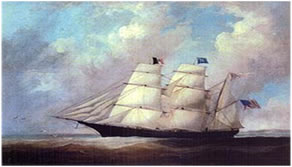
“Foreign importation of slaves was illegal and negligible after 1808. Participation in the slave trade to other
countries was also illegal for Americas. But in fact, New Englanders, who had plenty of shipping and
entrepreneurial energy, continued to invest and participate in the traffic from Africa to Latin America on
a considerable scale. Including the Brown family who endowed Brown University, and Thomas H. Perkins,
the Boston merchant prince who bankrolled Daniel Webster’s career, as well as many a lesser fry.
The last known New England slave ship, sailing out of Maine, was captured in 1862, a year in which
oceans of blood were being shed for the alleged purpose of freeing the slaves.”
(Dr. Clyde N. Wilson, Spielberg’s Amistad, page 181)
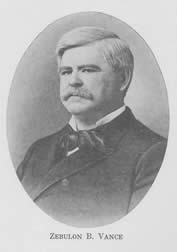
Senator and former-Governor Zebulon B. Vance reviews the settling of America, introduction
of African slavery, and New England's transatlantic commerce in slaves. The following is excerpted
from a speech in the United States Senate, January 30, 1890.
New England’s Commerce in Slaves:
"Several hundred years ago this fair land of ours, which it would seem God had specially intended for the
seat of liberty and the noblest development of man, was desecrated by the introduction of human slavery.
The serpent thus entered into our political Eden. The great forests which covered the face of the earth
called for labor to remove them, for more labor than the slowly coming immigration of the free races
afforded. The morals of the age justified the holding of barbarous races in bondage.
The favorite place for obtaining bondsmen was the African coast. So desirable did the supplying of the
newly discovered islands and continents of the West with cheap labor appear, that old Joseph Hawkins
was knighted by Queen Elizabeth, as much for his successful introduction of a cargo of slaves into the
West Indies, as for his exploits against the Spaniards. Even so great an good a man as Las Casas, the
Spanish apostle to the Indians, once advocated the introduction of African slavery.
First and foremost in this calamitous and iniquitous traffic was New England. In fact, so anxious were the
good people of those colonies for slaves that they reduced to bondage the native Indians whom they
captured in war, and, not infrequently, those wicked people of their own race and blood who were
guilty of differing from them in religious opinions.
The tobacco-growing colonies of the South soon followed suit in the importation of African slaves,
and early found how profitable this cheap and involuntary labor was in the raising of their great staple.
The introduction of the cultivation and uses of cotton soon gave a further impetus to slaveholding, and
made the chief prosperity of all the Southern regions to depend mainly upon this enforced labor.
Whilst the want of profitable returns gradually lessened the hold of the North upon slavery, its great
profits constantly increased that hold upon the South.
The stony and sterile fields of New England called for manufactures and commerce. That commerce
consisted very largely in purchasing slaves on the African coast, and selling them to Southern planters.
After a time [slavery] ceased to exist altogether in the North, by reason of emancipation….and by
their sales to their Southern neighbors.
By this time the wrongfulness of holding slaves fully dawned upon the conscience of the Northern people.
Its prickings became so active that they not only deemed it a sin to hold a slave themselves, but to permit
anybody else to hold one, even though there was no responsibility whatever upon them for the transgression.
They even went so far in obeying the dictates of conscience, that they did not hesitate to stand up boldly
in the sight of God, with the purchase money in their pockets, and denounce the vengeance of heaven
against their Southern neighbors for holding on to the Negro which they themselves had sold them.”
(Life of Zebulon B. Vance, pp. 240-241)
An Infernal Traffic Originating in British Avarice
“The supreme opportunity for suppressing the importation of slaves and thus hastening the day of
emancipation came with the adoption of the Federal Constitution. [With] every increase in the
number of slaves [imported] the difficulties and dangers of emancipation were multiplied. The hope
of emancipation rested in stopping their further importation and dispersing throughout the land those
who had already found a home in our midst.
To put an end to “this pernicious traffic” was therefore the supreme duty of the hour, but despite
Virginia’s protests and appeals the foreign slave trade was legalized by the Federal Constitution for
an additional period of twenty years.
The nation knew not the day of its visitation – with blinded eye and reckless hand it sowed the
dragon’s teeth from which have sprung the conditions and problems which even to-day tax the
thought and conscience of the American people. The action of the [constitutional] convention is
declared by Mr. Fiske, to have been “a bargain between New England and the far South.”
“New Hampshire, Massachusetts and Connecticut,” he adds, “consented to the prolonging of the
foreign slave trade for twenty years, or until 1808; and in return South Carolina and Georgia
consented to the clause empowering Congress to pass Navigation Acts and otherwise regulate
commerce by a simple majority of votes.”
Continuing, Mr. Fiske says, “This compromise was carried against the sturdy opposition o Virginia.”
George Mason spoke the sentiments of the Mother-Commonwealth when in a speech against this
provision of the constitution, which reads like prophecy and judgment, he said:
“This infernal traffic originated in the avarice of British merchants. The British Government constantly
checked the attempts of Virginia to put a stop to it. The present question concerns, not the importing
States alone, but the whole Union . . . Maryland and Virginia, he said, had already prohibited the
importation of slaves expressly. North Carolina had done the same in substance. All this would
be in vain if South Carolina and Georgia were at liberty to import.
The Western people are already calling out for slaves for their new lands; and will fill that country with
slaves if they can be got through South Carolina and Georgia. Slavery discourages arts and manufactures.
The poor despise labor when performed by slaves. They prevent the emigration of whites, who really
enrich and strengthen a country. They produce the most pernicious effect on manners.
Every master of slaves is born a petty tyrant. They bring the judgment of Heaven on a country.
As nations cannot be rewarded or punished in the next world, they must be in this. By an inevitable
chain of cause and events, Providence punishes National sins by National calamities."
He lamented that some of our Eastern [New England] brethren had, from a lust of gain,
embarked in this nefarious traffic.
“But these prophetic words of George Mason,” adds Mr. Fiske, “were powerless against the combination
of New England and the far South. Governor Randolph and Mr. Madison earnestly supported their
colleague . . . and the latter asserting: “Twenty years will produce all the mischief that can be
apprehended from the liberty to import slaves. So long a term will be more dishonorable to the
American character than to say nothing about it in the constitution.
Thus it was by the votes of New Hampshire, Massachusetts, Connecticut, Maryland, North Carolina,
South Carolina and Georgia, and against the votes of New Jersey, Pennsylvania, Delaware and Virginia,
that the slave trade was legalized by the National Government for the period from 1787 to 1808.”
(Virginia’s Attitude Toward Slavery and Secession, Beverly B. Mumford, L.H. Jenkins, 1909, pp. 29-31)

New England's Slave Trade and Cotton Mills
New York Enriched by the South:
“[In Philip S. Foner’s] study Business and Slavery, [The New York Merchants and the Irrepressible Conflict,
1941, he] discloses the innumerable economic ties between New York and the South. “The influence of the
South upon New York’s economic life started at the port, and proceeded uptown, touching every form of
business activity on the way.” Foner has pointed out that the cotton trade was dominated by New York,
that often 30 or 40 per cent of the price of cotton went to New Yorkers. In one year alone, 1849, the
South purchased more than seventy-six million dollars worth of merchandise in New York.

Such a productive relationship was of course carefully guarded by merchants. Moreover, these
economic ties, according to Foner, inevitably reflected themselves in social ties. New York merchants
gave generously to Southern charities. Partnerships, friendships, even marriages
joined New York and Southern families.
This attachment and loyalty to the South also extended back to the older generation of New York
writers. James Kirke [Paulding’s] ties with the South were the strongest. Paulding praised the
“domestic education” which was given the daughters of the planters. In the “chaste simplicity of
their manners….the cultivation of their minds….the purity of their hearts,” he believed them superior to
Northern ladies.
He was impressed by the spontaneous laughter of the Negroes and by the excellence of their musical
talents. “They are by far the most musical of any portion of the inhabitants of the United States, and in
the evening I have seen them reclining in their boats on the canal at Richmond, playing the banjo,
and singing in a style – I dare say equal to a Venetian gondolier. They whistle as clear as the note of a fife.”
In 1842 Paulding traveled through the deep South with Martin Van Buren…..[who] was beginning to seek
the Democratic nomination for the Presidency. To his surprise, Paulding found New Orleans “one of the most
orderly, decorous cities in the world.” He liked the opulence of New Orleans and the wealth and
independence of Louisiana, and he enjoyed the hospitality of the sugar planters along the Mississippi River.
Paulding said that, so far as he knew, the Negroes of the deep South were no more mistreated than they
were in the Northern slave States. In Slavery in the United States, Paulding argued that emancipation would
bring greater evils than slavery itself, and maintained that the Negroes were for the most part happy and well
adjusted as slaves. In [his previous] 1817 edition of his Letters he observed that the Northern, “loaded with a
pack of prejudices as large as a pedlar’s” realized when he travelled South that he had been
misled about Southern manners.”
(The South in Northern Eyes, 1831-1861, Howard R. Floan, McGRaw-Hill, 1958, pp. 111-115)
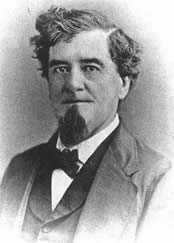
John Newland Maffitt
“In 1858, a U.S. Navy vessel intercepted a suspicious looking ship near the Cuban coast.
It turned out to be the Echo out of Providence, Rhode Island, with over 400 Africans on board,
many of them in very miserable condition. The officer who captured the slaver was John N. Maffitt,
who a few years later would be famous as commander of the Confederate raider Florida.
The captain and owner of the slaver was Edward Townsend, a well-educated man
from what passed for a good family in Rhode Island.
He alleged that the Africans were all war captives or families of executed criminals and he had
saved them from certain death. He also said that he had completed his voyage, he and
his silent investors could have cleared $130,000, a staggering sum in those days.
Maffitt took Townsend to Key West to be prosecuted. The Northern-born federal judge, later
a Unionist, refused to take jurisdiction. Maffitt then had him sent to Boston, where the court had
jurisdiction on the presumed point of origin of the Echo. There the federal judge also refused
to proceed and Townsend walked free, though guilty of a crime
equivalent to piracy in U.S. and international law.”
(Dr. Clyde N. Wilson, Spielberg’s Amistad, page 182)
Northern Abolitionists Incite Bloody Slave Insurrections
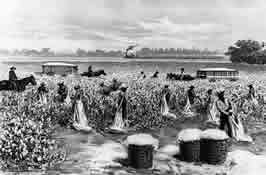
A Mortal Fear of Slave Insurrections:
"Hon. Kemp P. Battle in his centennial address, "Early History of Raleigh," page 44, says of insurrections:
"It is impossible for us to imagine what terror rumors of insurrections among slaves caused our ancestors.
They created a wild panic in which reason and sense had no part. We find such rumors common in the
early part of the century. The most notable was in June, 1802 when the discovery that one (slave)
Frank Sumner had embodied a company of thirteen men under his leadership as captain, threw the whole
country from Tar River to the Atlantic into consternation.
Volunteer companies were organized for patrolling and arresting suspected persons. Martial law reigned supreme.
The writ of habeas corpus was suspended in practice, though not by law, as to the Negro race. At the time
one hundred men were locked up in Martin County jail. Captain Frank Sumner for his ill-timed ambition was
promptly hung by judgment of a special court, and his deluded followers were glad to escape--one with the
loss of his ears, one with branding, the rest with flogging.
When Nat Turner's massacre of fifty-five persons occurred in Southampton, Virginia, in 1831, the whole
of Raleigh was placed under arms. The able-bodied were divided into four companies, each to patrol the
streets every fourth night. The old men were organized as Silver Grays. The fortress was the Presbyterian
Church, and it was agreed that whenever the State House bell should sound the women and children
were to hasten to its protecting walls.
At last one night O'Rourke's blacksmith shop took fire. It was night, says my informant, whose hair is
frosted now; but he remembers as vividly as if it were yesterday, the women with disheveled hair and
in their night clothes running for life through the streets. It was no laughing matter to them. One of our
most venerable and intelligent old ladies (and she is an uncommonly brave woman), although she
disbelieved the stories, yet when she heard the loud clangor of the bells at midnight, drew her children
around her, determined to beg the enemy to kill them first so that she might see them safe in death
rather than be the first to die, leaving them to brutality and torture. But her son, then a mere boy,
brandished his deceased father's sword and prepared to defend the household. I hope he will pardon
me for mentioning an act so much to his credit. It was our Raleigh poet--James Fontleroy Taylor.
The Negroes were frightened more than the whites. They fled and hid under houses, in garden
shrubbery, lay between corn rows, anywhere for safety. There never was a time when the colored people of
Raleigh would have risen against our people. It is greatly to the credit of both races that notwithstanding
party animosity and sudden emancipation, the kindly personal feeling between the whites and their
old servants has never been interrupted."
Reminiscences and Memoirs of North Carolina and Eminent North Carolinians, John H. Wheeler)
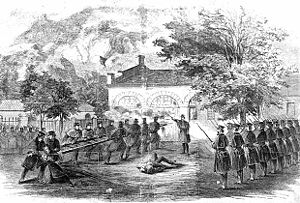
Harper's Ferry Invasion Shocks the South
“Southern reaction to [John Brown’s] Harper’s Ferry Raid was one on shock. Most Southern moderates,
who had heretofore thought compromise [with the North regarding slavery] was possible, were rudely
awakened to the extremes to which some Northern anti-slavery radicals were now willing to go.
Before Harper’s Ferry, many Southerners would have refused to believe any but the most
radical Northerners would value anti-slavery more than the sense of comity between States in the Union.
Harper’s Ferry, and the Northern reaction to it, put an end to that belief in the minds of Southerners.
Subsequent events would show the condoning of the Harper’s Ferry invasion was not restricted
to private citizens of New England, but was an idea found across the North, including some in public office.”
John Taylor, “What We Have to Expect,” Confederate Veteran, July/August, 2012, page 19)
Fear of Slave Insurrections Drives Secession:
“As early as 1831, Governor [Montfort] Stokes, of North Carolina, had called the Legislature’s attention
to efforts being made at the North to excite servile insurrection at the South, and now a new crusade
was threatened. When Congress met in December, 1859, the Republicans, who did not have quite
a majority, proposed one of their number for speaker [of the House].
At once a Democrat offered a resolution that no man who had assisted in the distribution of the
abominable book suggesting negro insurrection was fit to be Speaker….at length, Pennington,
a Whig, was elected Speaker. Then, at the ensuing election for President, the candidate of these
[Republican] men was elected by the Northern States in a whoop.
Did the people of Fayetteville, N.C., in October, 1860, understand the situation when they asked the
War Department to station a company [of US soldiers] at Fayetteville for protection [against slave insurrection],
and the soldiers sent?
When President Lincoln, in September, 1862, issued his proclamation threatening the emancipation
of the Southern slaves, that subject of slave insurrections was discussed in the public newspapers of
the North. Mr. Lincoln said it was a moral question that did not concern him. Then did the people
of the South understand what Lincoln’s soldiers meant when they proclaimed
that “John Brown’s soul was marching on?”
{The] Cotton States left the companionship of the Northern States then threatening them with
negro insurrections. It was because they preferred to escape negro insurrections that they
sought safety by withdrawing from the Union.”
(Did the South Understand?, Capt. S.A. Ashe, Confederate Veteran, September-October, 1932, page 374)
Northern Resistance to Emancipation
Northern Workers Fear Emancipation Will Flood the Labor Market
“In late October [1860] the young Democratic leader Samuel J. Tilden warned that Southerners would see
a Republican-controlled government as an unacceptable “foreign government,” a situation that was likely
to bring a bloody civil war: “Defeat Lincoln and all our great interests and hopes are unquestionably safe.”
This warning was repeated by others sympathetic to the conservative cause, including the popular
[New York] Herald. Although nominally nonpartisan, the Herald was violently anti-Lincoln and predicted the
worst if he were elected. The secession of the South, it warned, would severely damage the economic
interests of the many New Yorkers dependent on the Southern trade, not only merchants but ship
carpenters, shoemakers, carriage makers, and other artisans.
Elect Lincoln, the Herald predicted, and “one hundred thousand workmen and working women will be
thrown out of employment.” And that was not all: “Irish and German laborers! If Lincoln is elected today you
will have to compete with the labor of four million emancipated Negroes.”
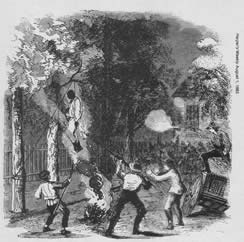
New York City Draft Riot, 1863
Lincoln polled 32,641 votes in Gotham, but his opponents won 59,728, defeating him in every ward in the city.
However, the Democratic majority of 32,000 was not enough to outweigh the flood of Lincoln votes upstate.
The long-feared crisis of the Union had come. On December 15, 1860, prominent Democratic politicians
and merchants, including Samuel J. Tilden and William B. Astor, met privately on Pine Street in
New York City. The meeting passed resolution for the protection of slavery to mollify secessionists and
appointed a committee headed by former President Millard Fillmore to go to the South with assurances of
support for the Southern cause. The Pine Street meeting was only the first of several efforts by conservatives
to save the Union through concessions to slaveholders, most notably be amending the Constitution
to provide permanent protection for slavery.”
(Gotham At War, New York City, 1860-1865, Edward K. Spann, SR Books, 2002, pp. 4-5)
Not A War To End Slavery:
"On the 22nd of July, 1861, both Houses of [the United States] Congress with but a few dissenting votes
adopted a joint resolution which declared:
"This war is not waged, on our part, in any spirit of oppression, not for any purpose of conquest or subjugation,
nor purpose of overthrowing or interfering with the rights or established institutions of those States; but to defend
and maintain the supremacy of the constitution, and to preserve the Union, with all the dignity, equality and rights
of the several States unimpaired; that, as soon as these objects are accomplished, the war ought to cease."
Such were the attitude of the Republican party, the avowals and pledges of President Lincoln and the
enactments of Congress, with respect to slavery, at the time of Virginia's secession."
(Virginia's Attitude Toward Slavery and Secession," Beverley Mumford, L.H. Jenkins, 1909, page 197)
Northerner’s View of Slavery in 1911:
“This much must be conceded, that the Northern States were just as responsible for the existence of
slavery as were the Southern States…and it grew stronger in the Southern States after the invention of
Eli Whitney’s cotton gin, simply because it was enormously profitable, and property and
slaves correspondingly valuable.
Sometimes the question is asked, “Were not the slaves better off under slavery than they are now
under freedom?” I think a candid answer to that question demands us to say than some were better
off under slavery than they are under freedom.
The abolition of slavery acted on the colored race like a wedge, forcing some down and some up. Those who
were fit for freedom, prepared to embrace and make the most of the opportunities offered them as
free man, rose. But some were not fit for freedom. Now that is no reflection upon the colored race. We have
a very large proportion of the white race that are not fit for freedom. We have innumerable numbers of
men and women that we are compelled to confine in institutions and keep as wards of the State,
or they destroy themselves and everybody else.
If slavery was an utterly evil institution, with no alleviating features, how are we to account for the fact
that when the Confederate soldiers were at the front fighting, as they thought, for their independence, the
Negroes on the plantations took care of the women and children and old people, and nothing like an act
of violence was ever known among them?
I have seen at Charleston, S.C., a monument erected by former slaveholders and their descendants
in grateful acknowledgment of the fidelity of those slaves who remained upon the plantations and cared
for their women and children while they were at the front, and I understand that the Confederate veterans
are also to erect another such monument.
Certainly such kindly feeling between master and slave shows that there must have been something good
in the institution of slavery. So we should not look back at the institution of slavery as a reign of unalleviated
wickedness and horror, but remember that it had within itself, in spite of its many abuses and intolerable
horrors, much that was good.
A letter from President Taft was also read by Dr. Stowe:
The White House, Washington, D.C.
“I am not one of those who believe that it is well to educate that mass of Negroes with academic or university
education. On the contrary, I am firmly convinced that the hope of the Negro is in his industrial education throughout
the South and in teaching him to be a better farmer, a better carpenter, a better machinist, and a better
blacksmith than he is now, and to make more blacksmiths and more good farmers
than there now are among the Negroes.”
(Honest Confession Good for the Country, Son of Harriet Beecher Stowe Makes Address
at Fisk University, Nashville. Confederate Veteran, July, 1911, pp. 326-327)
Black Soldiers for Mr. Lincoln's Army
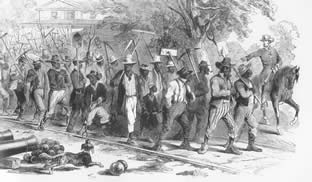
Lincoln Plays His Last Card:
“In addition to the gathering of fugitive Negroes into camps and their use in the cotton field, the [Northern]
military officials continued to use them as labor battalions for the army. In the Commissary Department,
on railroads and steamboats, and especially the construction of fortifications, the armies found the
former slaves extremely useful.
Late in 1863, no less than three thousand of them were being employed in the building of Federal
breastworks around Natchez. Although it was soon decided that these workers were to receive a small
payment for their labor, much lower than that for whites, the [Northern] government was slow
in delivering the money to them.
In January 1863, chaplains in the Department of the West reported that the government was $20,000
behind in the wages of the Negroes, and that many of them had worked for several months with no pay at all.
In some cases, after the arrival of the money, the generals ordered the wages retained for a decision
as to whether it should be paid to the Negroes or to their former owners.
Early in 1863 the [Northern] President and his Secretary of War abandoned much of their earlier
caution, and decided on the enlistment of large numbers of the freedmen as soldiers. This decision
grew out of the realities of the situation. It was made logical by the Emancipation Proclamation, and
almost essential by the stubborn resistance of the South and by the bitter opposition to general
conscription in the North.
[But]…this absorption of the freedmen into the fighting forces of the Union met stiff opposition from
within the ranks. [Northern Chaplain] John Eaton, who had long been disturbed by the friction “engendered….
by any forced relationship between the Negro and the Union soldier,” immediately recommended
establishment of separate regiments for the freedmen, although he insisted upon the necessity
of their having white officers. These officers, when obtained, faced the scorn of their white colleagues.
General [Henry] Halleck, who had steadily opposed the increasing emphasis placed on the Negro in the
conduct of the war….admitted the apparent impossibility of filling the Federal ranks through conscription.
[Former slaves] who resisted [the] early pressure [to enlist] often succumbed to the lure of recruiting officers
swarming in from the North to offer bounties for recruits to be credited on the draft quota’s of their State’s.”
(The Negro in Mississippi, 1865-1890, Vernon Lane Wharton, Harper Torchbook, 1965, pp. 30-31)
London Times, November 7, 1864:
“The North has broadly admitted that without the 200,000 Negroes whom it has in their service it would
find it impossible to continue the conflict. These Negroes were obtained by the simple process of
first manumitting the slaves of disloyal Southern proprietors, and then, by way of a sample of their
newly acquired freedom, impressing them into the ranks of the Northern armies. The South has so
far resisted the larger population of the Northern States, fed by a continual supply of German
and Irish emigration….[and Negroes by the device] of making them free in order to plunge
them into the very worst of slavery.
The Negroes must, indeed, be freed, not as a concession to Northern opinion, but as a reward for
the defence of the Southern cause. “We have,” says [a] Southern paper, “in our midst half a million
of fighting material…shall we use the material for the common cause?”
(The Gray and the Black, Robert F. Durden, LSU Press, 1972, pp. 83-84)
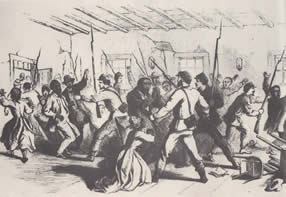
Raiding Florida Plantations, Capturing Slaves:
“On March 27, Colonel Montgomery and 120 black troops boarded Commander Charles Steedman’s
gunboat Paul Jones, and started on an expedition upriver to Palatka, raiding plantations along the way.
Thomas T. Russell, a local planter, reported that at least six landings were made and that black troops
carried off slaves, horses, carts, poultry, hogs, cotton, salt---everything they could lay their hands on…
and abused and insulted the women just as they pleased.” Confederate Captain Dickinson and about
fifty horsemen greeted the gunboat with a hail of fire [at Palatka, and stated] “My little command is
again ready for them, and will contest every bit of ground if they should attempt another landing.”
It was exactly the kind of reaction that Abraham Lincoln had hoped for. On learning of these developments,
Lincoln wrote to General Hunter:
“I am glad to see the accounts of your colored force at Jacksonville…I see the enemy are driving at them fiercely,
as is to be expected. It is important to the enemy that such a force shall not take shape and grow and
thrive in the South, and in precisely the same proportion it is important to us that it shall.”
General [Rufus] Saxton also recognized the psychological value of the black troops; in a report to Secretary
of War Stanton, he wrote that it was his “belief that scarcely an incident in this war has caused a greater panic
throughout the Southern coast than this raid of the colored troops in Florida.”
(Jacksonville’s Ordeal by Fire, Martin & Schafer, Florida Publishing Company, 1984, page 160)
Farming Despite Marauding Yankees
“When it was evident in 1865 that Sherman would march on Goldsborough, I thought that he would lead
his army northward from that town. It seemed best therefore to buy a farm in Wake [county] so as to
have something to fall back on if the Edgecombe [county] places should be devastated. It was a
mistake but not a costly one. Sherman came to Raleigh instead of marching north from Goldsborough
but my place was eighteen miles from Raleigh and too much out of the way to be ravaged. My mules
and corn and fodder were taken but there was no wanton destruction.
After peace was declared, I told the Negroes that they might cultivate the crops already planted and
we would leave it to the agent in charge of the Freedman’s Bureau to divide the crops. I further agreed
that I would at my expense transport them and their household property back to Edgecombe. This
satisfied them but when the Government officer (called by them the Bureau) made his award, he placed an
undue estimate on the share to which the land was entitled. He gave me double what was usual and I at
once reduced this allowance to one-third of the corn and one-fourth of the cotton.
I told my Negroes early in the war that if the North succeeded, freedom would be brought to them. They would
gain nothing by running off, on the contrary would incur danger and trouble. I doubt whether this was needed
as other slaves than mine continued quietly at work. But it is a remarkable evidence of their docility and of
their previous kind treatment that when the cotton factory at Rocky Mount was burned by Northern cavalry
from New Bern, they loaded the wagons with meat under supervision of my overseer, Mr. Norris, hauled
the load three or four miles into the piney woods, and remained quiet while the Federals passed by.
Not one showed a disposition to join the soldiers. After the war at least half of my hands continued
to work as freely hired or as tenants. Some thought that it looked more like freedom to leave “Old Marster”
and work for somebody else but nearly all continued on the Tar River farms.”
(Memories of an Old time Tarheel, pp. 129-130)
Black Soldiers for Mr. Davis's Army
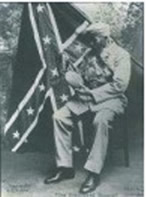
“Kent Masterson Brown, a distinguished lawyer from Kentucky who is also a well-known
Civil War historian…found that when the survivors came back from the Pickett-Pettigrew
charge [at Gettysburg], they returned to Confederate lines that were lined with black faces.
Some 6,000 to 10,000 black men went with the army into Pennsylvania – and back.
The English observer Col. Arthur Fremantle saw a black Confederate marching a
Yankee prisoner to the rear. He wondered at their reaction if the abolitionists in London
could see that. Brown found that many of those black men after Gettysburg took their
wounded and dead masters home, sometimes to distant places in the far South.
It is hard for current folks to accept, but relations between blacks and whites in the South
were sometimes familial. In soldiers’ letters (and this is also true of ante-bellum
Southerners in general) it is sometimes difficult to determine whether people mentioned
are family members or servants. When you think about it, this is not at all unusual.
History is full of examples of faithful retainers and servants fighting for their
masters and against their master’s enemies.
Black and white Southerners have different histories, of course, but I very much believe
that we should emphasize the good parts of the common history that we have shared.
From my outsider’s viewpoint, it seems to me a plus for African-Americans to recognize
that their history is much more complex, multi-dimensional, and interesting than a
simple (and false) story of repression and rebellion.”
(Dr. Clyde N. Wilson, Black Confederates Reconsidered, page 177)
Black Soldiers Defend Louisiana:
“Within days [of Louisiana’s secession] a regiment composed entirely of free men of color had
been organized; it was called the Native Guards. Governor Thomas D. Moore accepted the regiment
as part of the Louisiana militia on May 2, 1861, and issued commissions for the line officers,
all of whom were black.
The governor appointed a white militia officer, Colonel Henry D. Ogden, as commander.
White New Orleans was delighted with the formation of a black militia regiment. “Our free colored men….
are certainly much attached to the land of their birth as their white brethren here in Louisiana,”
the Daily Crescent assured its readers. They “will fight the Black Republican with as much
determination and gallantry as any body of white men in the service of the Confederate States.”
Black soldiers in the State militia were not unusual in Louisiana….armed slaves and free men of color
had joined the French in 1727 to fight against the Choctaw Indians. Eight years later, forty-five black
men served alongside French colonial troops in New Orleans. When the Louisiana Territory became
part on the United States in 1803, black men continued to serve in the militia. In 1811, they helped
the territorial governor suppress a slave insurrection. Four years later, slaves and free men
of color fought with Andrew Jackson at the Battle of New Orleans.”
(The Louisiana Native Guards, page 2-3)
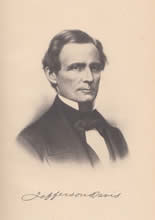
President Jefferson Davis on Black Soldiers:
“The act of February 17, 1864….which authorized the employment of slaves….brought forward….the
question of employment of the negroes as soldiers in the army, which was warmly advocated by some
as ardently opposed by others. My own views upon it were expressed freely and frequently in intercourse
with members of Congress, and emphatically in my message of November 7, 1864…:
“The slave, however, bears another relation to the state – that of a person. Should he be retained in servitude,
or should his emancipation be held out to him as a reward for past faithful service, or should it be granted at
once on the promise of such service….The policy of engaging to liberate the negro on his discharge after
service faithfully rendered seems to me preferable to that of granting immediate manumission,
or that of retaining his servitude.
A broad moral distinction exists between the use of slaves as soldiers in defense of their homes and the
incitement of the same persons to insurrection against their masters. The one is justifiable, if necessary,
the other is iniquitous and unworthy of civilized people; and such is the judgment of all writers on public law,
as well as that expressed and insisted on by our enemies in all wars prior to that now waged against us.
[In 1776]….the climax of atrocity was deemed to be reached only when the English monarch was
denounced as having “excited domestic insurrection among us.”
[I]…must dissent from those who advise a general levy and arming of the slaves for the duty of soldiers.
Until our white population shall prove insufficient for the armies we require and can afford to keep in
the field, to employ the slave as a soldier the negro, who has merely been trained to labor, and,
as a laborer, the white man accustomed from his youth to the use of arms, would scarcely be
deemed wise or advantageous by any; and this is the question now before us.
But should the alternative ever be presented of subjugation, or the employment of the slave as a soldier,
there seems no reason to doubt what should then be our decision. Whether our view embraces what would,
in so extreme a case, be the sum of misery entailed by the dominion of the enemy, or be restricted solely
to the effect upon the welfare and happiness of the negro population themselves, the result would be the same.
[Our task has been]….that of Christianizing and improving the condition of the Africans who have by the will
of Providence been placed in our charge. If the recommendation above, made for the training of forty thousand
negroes for the service indicated, shall meet [the approval of the Confederate Congress], it5 is certain that
even this limited number, by their preparatory training in intermediate duties, would form a valuable reserve
force in case of urgency than threefold their number suddenly called from field-labor, while a fresh levy could
to a certain extent supply their places in the special service for which they are now employed.”
Subsequent events advanced my views form a prospective to a present need for the enrollment of negroes
to take their place in the ranks. To a member of the Senate…..I stated, as I had done to many others, the
fact of having led [armed] negroes against a lawless body of armed white men, and the assurance which the
experiment gave me that the might, under proper conditions, be relied on in battle, and finally used to
him the expression which I believe I can repeat exactly: “If the Confederacy fails, there should be written
on its tombstone, “Died of a theory.”
(The Rise and Fall of the Confederate Government, Volume I, pp. 515-518)
Opinion of a Halifax County Confederate Officer, Richmond Enquirer, November 4, 1864:
“That the Negro will fight more faithfully for his master than for the Yankee, no one can doubt who
has seen the attachment of slaves to their masters in camp, and the reliance and faithfulness
with which they discharge sometimes the most dangerous and difficult duties. Then too, the
wonderful change which would be brought upon them by giving such as were enlisted their
immediate freedom, with the promise of a grant of land after the war, would cause them to
acknowledge and look upon the Yankee as their inferior….
Let Congress take this into consideration at an early day.”
(The Gray and the Black, Robert F. Durden, page 87)
Emancipation to Help Achieve Southern Independence:
“Lincoln has acknowledged that he relies more upon his two hundred thousand Negro soldiers,
than upon all the whites at his command. Without them, he says, it would strip the North of its
white population to conquer the South and end the war. However this may me, we know that he
is making good use of Negro soldiers. When, therefore, we see a Government controlling
a population three times greater than ours, buying up European mercenaries and
pressing our slaves into its service to save its native population from the ravages of the sword,
it becomes a question for us to consider whether our prejudices should longer allow us to
condemn the flower of our population, the hope of the country, to be wasted and destroyed,
rather than to mould to our use and make subsidiary, to the great ends of independence….
the race that has for so long acknowledged our guidance and control.
We believe that an army of two hundred thousand able-bodied slaves….could be organized and
induced to fight for their freedom on the Southern side of this question. We should agree to give
it to them and a home amongst us for themselves and their posterity in all time to come.
If they will fight for freedom by the side of strangers from the North, they will fight better
for the same boon in the armies where the sons of their former masters contend
for the homes of both master and slave.”
(Lynchburg Virginian, October 8, 1864 editorial; The Gray and the Black, pp. 76-77)
From Mrs. Bryce Russell of Lenoir County, North Carolina:
“Grandmother went out to the kitchen to give the news of Lee’s surrender to her old cook.
She said, “You are free to leave here and do what you please.” After giving that new idea time
to register Aunt Susan replied, “Mistis, Marse General Lee ought to be tarred and feathered for doing that!”
(True Tales of the South at War, Clarence Poe, editor, pp. 189-190)
![]()
Africa Squadron, Donald L. Canney, Potomac Books, 2006
The Adventures of an African Slaver, Albert & Charles Boni, Garden City Publishing,1928
The Slaves of Timbuktu, Robin Maugham, Harper & Brothers, 1961
Life of Zebulon B. Vance, Clement Dowd, Observer Printing & Publishing House, 1897
North of Slavery, Leon F. Litwack, University of Chicago Press, 1961
Disowning Slavery, Joanne Pope Melish, Cornell University Press, 1998
The Liberty Line, Larry Gara, University Press of Kentucky, 1961
The Confederate Constitution of 1861, Marshall L. DeRosa, University of Missouri Press, 1991
The Debate on Slavery, Jonathan Blanchard & N.L. Rice, Moore & Co., 1846
Haiti, The Politics of Squalor, Robert I. Rotberg, Houghton Mifflin, 1971
Rum, Slaves & Molasses, Clifford Lindsey Alderman, Crowell-Collier Press, 1972
The Diligent, Robert Harms, Basic Books, 2002
Hanging Captain Gordon, Ron Soodalter, Atria Books, 2006
The Louisiana Native Guards, James G. Hollandsworth, Jr., LSU Press, 1995
Black Southerners in Confederate Armies, Segars & Barrow, Southern Lion Books, 2001
The Grey and the Black, Confederate Debate on Emancipation, Robert F. Durden, LSU Press, 1972
Black Southerners in Gray, Richard Rollins, editor, Rank & File Publications, 1994
Forgotten Confederates, Barrow, Segars & Rosenburg, Southern Heritage Press, 1995
Slave Ships and Slaving, Charles Francis Dow, Cornell Maritime Press, 1927
Sons of Providence, Charles Rappleye, Simon & Schuster, 2006
Black Cargoes, Daniel Mannix, Viking Press, 1962
Complicity, Farrow, Lang and Frank, Ballantine Books, 2006
Breaking Chains, Tom Pocock, Naval Institute Press, 2006
Defending Dixie, Clyde N. Wilson, Foundation for American Education, 2006
The Gray and the Black, Robert F. Durden, LSU Press, 1972
Memories of an Old time Tarheel, Kemp Plummer Battle, UNC Press, 1945
Rise and Fall of the Confederate Government, Volume I, Jefferson Davis, D. Appleton, 1881
Virginia’s Attitude Toward Slavery and Secession, Beverly B. Mumford, L.H. Jenkins, 1909
True Tales of the South at War, How Soldiers Fought and Families Lived, 1861-65, Clarence Poe, editor, Dover, 1995
Copyright 2012, The North Carolina War Between the States Sesquicentennial Commission